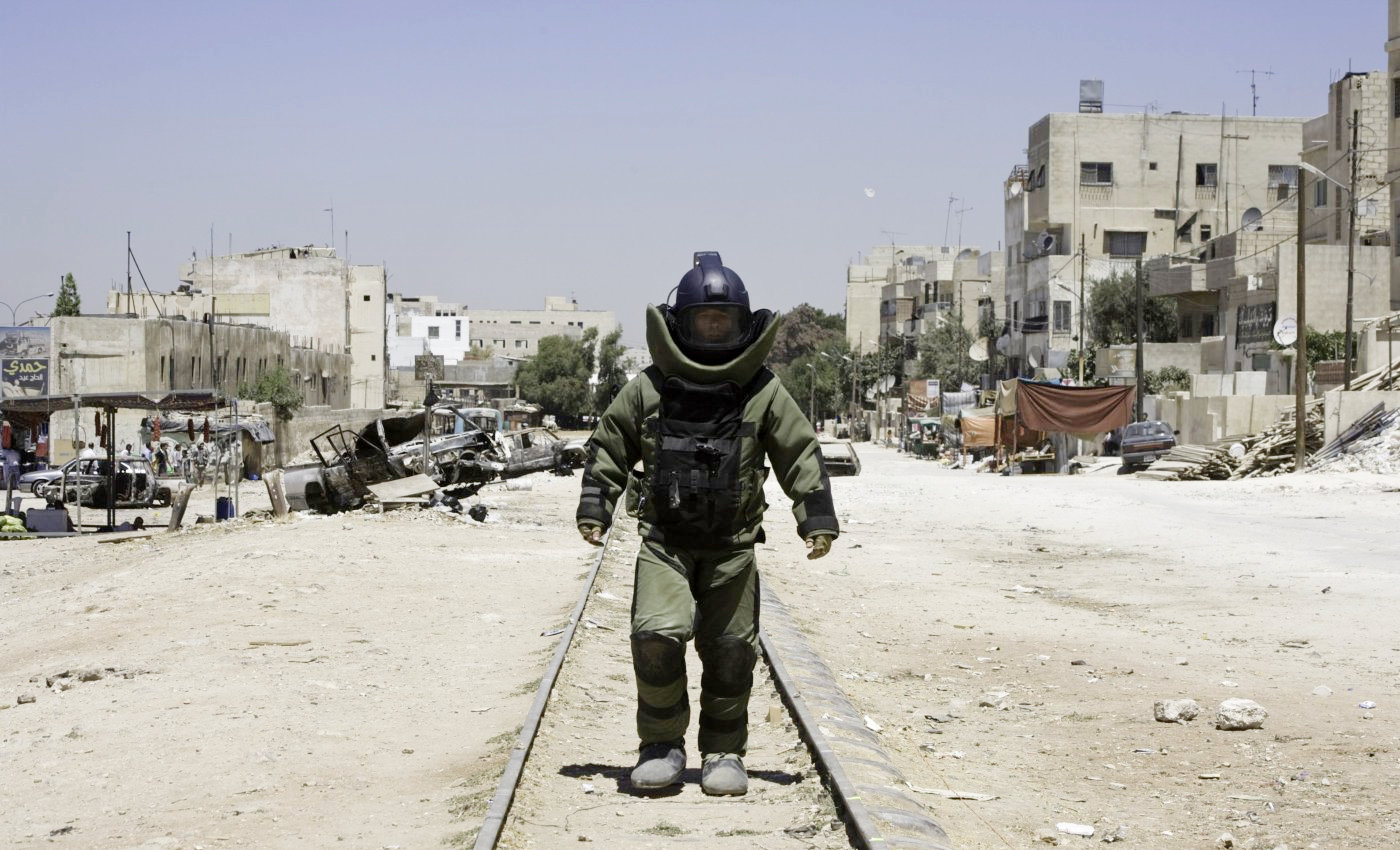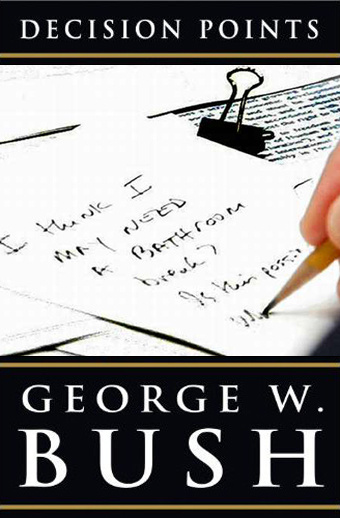
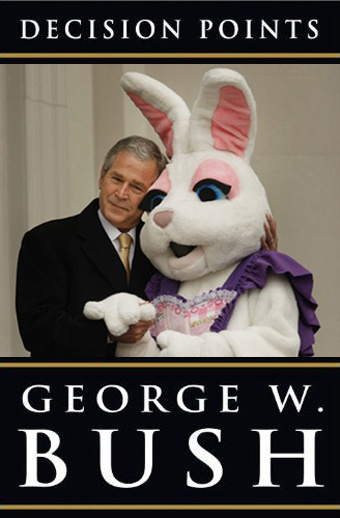

“Decision Point: Is it a good idea for me to land on an aircraft carrier in a flight suit with a sign that says ‘Mission Accomplished‘? Key Decision: How is it not a good idea?” On the announcement that former President Bush’s forthcoming memoirs will be called, um, Decision Points, the wags at the Gawker crime lab have some fun with Photoshop. (Speaking of decision points, I will concede that it’s very smart of the GOP powers-that-be to wait until the week after Election Day to remind America of the Dubya years.)
It’s Not Easy Being Green.
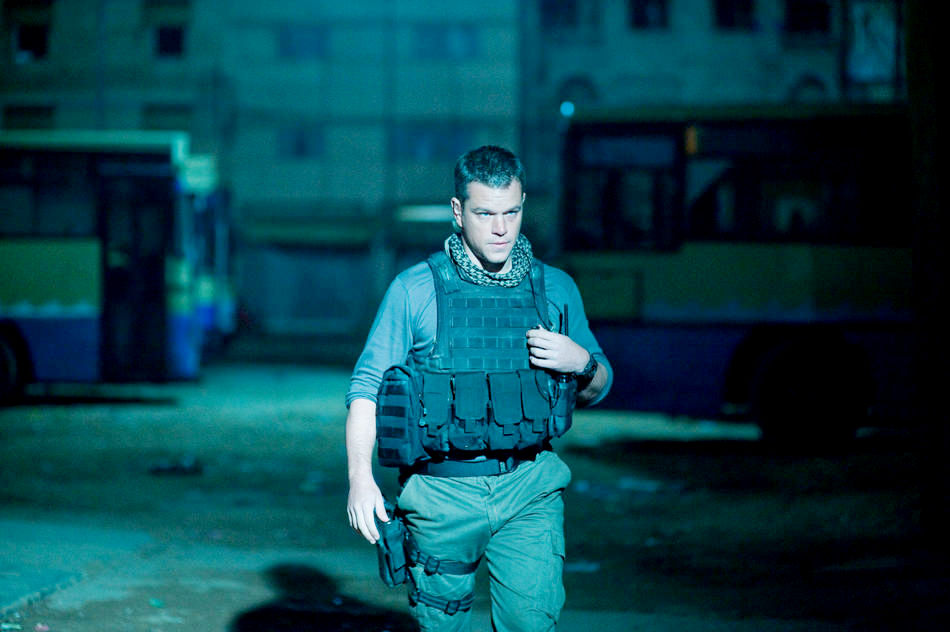
On this St. Patrick’s Day, what better recent release to discuss here at GitM than Paul Greengrass’ Green Zone? Not only do we have two shades of emerald in that last sentence, but we’re now on the cusp of the 7th anniversary of the beginning of the War in Iraq. (It broke out, I well remember, just as I was heading to a March Madness weekend in Vegas.) Alas, I just wish I had a better sitrep to report.
I don’t mean to be too harsh — There’s nothing terribly wrong with this edutainment-y attempt to explain de-Baathification, highly dubious detainee procedures, and most notably the faked WMD casus belli to disinterested laypersons by way of action-thriller. And, in a way, I sorta admire the gutsiness of the the attempt. But, if you were already well aware of these grim developments, and I assume most GitM readers are, then it’s hard to escape the sensation that one is mainly just being talked down to for two hours. Wait, there were no WMD in Iraq? You’re kidding me, right? And, while I’m a great fan of Greengrass’ previous output — I said over and over again in this space that I wish he had stuck with Watchmen, and on the Top 100 films of last decade list, Bloody Sunday was #84, his two Bournes were at #49, and the exemplary United 93 was at #6 — The Green Zone feels quite a bit more leaden than usual.
As with the political edutainment project Greengrass aspired to here, I like the idea of fusing his highly visceral action work (the Bournes) with his fly-on-the-wall discursions into recent history (Sunday, ’93)…on paper. But The Green Zone gets lost somewhere in the interstice, and lacks the gripping power of either of these previous Greengrass grooves. Instead, Zone ends up mostly being two grainy hours of watching Matt Damon run around at night, as he tries to uncover an insidious government plot that our nation has been fully aware of for years…and has chosen to greet with a yawn.
More on that depressing problem in a bit, but, first, to bring y’all up to speed: Loosely based on Rajiv Chandrasekaran’s Imperial Life in the Emerald City, a non-fiction examination of Dubyaite imbecility and excess in post-war Baghdad, Green Zone begins with a brief sequence set amid the original Shock-and-Awe period of the war, followed by, a few weeks later, a tense raid on a possible WMD storehouse by American soldiers. Led by Chief Warrant Officer Roy Miller (Damon), this crack MW2-ish assault ends up finding, well, bupkis, just like the time before and the time before that.
To Chief Miller, the problem here is obvious — the intel must be rotten. But, when he brings this up at the next briefing for high-level military muckety-mucks, he is basically told to shut up and do his job. Nonetheless, events soon conspire to introduce Miller to the “Jack of Clubs” in the Dubya deck, a Baathist general (Yigal Naor) with a still-clearly extant power base in Baghdad. And, when our hero digs deeper to figure out how this Jack might know “Magellan,” the top-secret source of all this lousy intel, he soon finds himself trapped — along with a very Judith Miller-y reporter (Amy Ryan) — in a power play between a slimy executive branch bureaucrat (Greg Kinnear, stuck no more) and a grizzled CIA hand (Brendan Gleeson), one that might just end up getting Miller fragged by the creepy Special Forces guy (Jason Isaacs, with great accent) who keeps popping up…
Along the way, there’s a digression into a detainee facility with all the makings of an Abu Ghraib waiting to happen, the tearful homecoming of the administration’s hand-picked Iraqi stooge (re: Ahmed Chalabi), some rather pained attempts to make the decision to de-Baathify an action beat…In other words, Green Zone is basically an attempt to dramatize the Iraq war for people who, for whatever reason, weren’t paying much attention the first time ’round. And, to be fair, it’s done with solid acting all around (including several folks recognizable from United 93), quality production values, and a reasonable degree of versimilitude throughout. (Note also the brief Paul Rieckhoff cameo, which should nip any IAVA whining about dramatic license right in the bud.)
But, for all its edutainmenty truths to tell, Green Zone still ends up feeling rather fake and film-ish to me, perhaps in part because — unlike Greengrass’ other recent histories — it seems to subscribe to a very movie-like All the President’s Men view of things, where, once word of misdeed gets out, justice will be done tho’ the heavens fall. Not to get all Debbie Downer up in here, but that’s not really the way the world works anymore, is it? One of the saddest and scariest moments in the recent and very worthwhile Daniel Ellsberg: The Most Dangerous Man in America is when Ellsberg explains how he thought everything would change once the Pentagon Papers got out…and then he finds that, in the face of clear and irrefutable evidence of government wrongdoing, most people just shrugged.
This is the uncomfortable horror that Green Zone almost seems willfully designed not to recognize. The whole premise of the movie seems to be that, if We the People knew what really went down in Iraq (or could just be taught via action-movie), we would be totally livid about the corruption involved. But, is the problem really that the American people don’t know what happened in the build-up to Iraq? Or is it that we know pretty well what happened and don’t much seem to care?
Just as with our indefensible dabbling in torture and indefinite detention in recent years, we have known about the lies and incompetence that fueled the Iraq fiasco for awhile now. And, alas, nothing ever happened. Dick Cheney, Karl Rove, and the whole awful, lying lot are still deemed Serious People with Serious Opinions by the nation’s domesticated media watchdogs, who, by the way, have also been studiously ignoring the Blair hearings overseas. Our current president, elected with the largest mandate for change in a generation, has deemed all of this just the sins of the past and refused to “look backward” (or worse, made himself complicit in these Dubya-era crimes.) And life continues, much as it has this past age, with no sense of reckoning whatsoever for the Big Lies that were told.
One of the main reasons Bloody Sunday and United 93 work so well is that they offer complex, nuanced portraits of complicated times. But, as Green Zone moves along, it just ended up feeling more and more like a cartoon to me, and one predicated mainly on wishful thinking. Like I said, I guess I admire what Paul Greengrass & co. were trying do here, but Green Zone as an action film feels flat and mostly uninvolving. And Green Zone as a political enterprise — Iraq War: The Movie!, basically — often seems at best condescending and at worst dangerously naive.
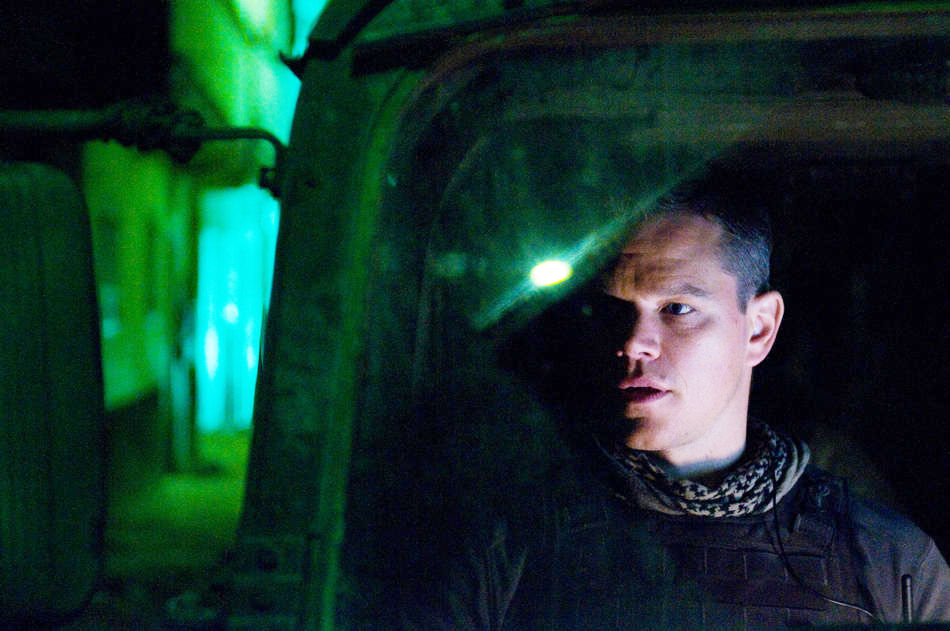
Praise the Lord and Pass the Ammo.

I like Saving Private Ryan as much as the next guy, but this, in a word, is ridicky-goddamn-diculous. Apparently, our troops in Iraq and Afghanistan are routinely outfitted with sniper rifles etched with New Testament verse. “Trijicon confirmed to ABCNews.com that it adds the biblical codes to the sights sold to the U.S. military. Tom Munson, director of sales and marketing for Trijicon…said the inscriptions ‘have always been there’ and said there was nothing wrong or illegal with adding them. Munson said the issue was being raised by a group that is ‘not Christian.’“
Newsflash: Given that we’re currently engaged in multiple wars and are strongly trying to avoid any appearance of being involved in any sort of anti-Muslim Crusade, arming our soldiers with “Jesus rifles” and crafting bible-thumping war reports for the Commander-in-Chief isn’t just catastrophically stupid. It’s basically writing the Al Qaeda recruiting posters for them.
Update: Also, “They started it!” is not an appropriate response to this dismal revelation.
Update 2: Trijicon stands down — Jesus rifles are hereby discontinued, most likely because of quotes like these: “General David Petraeus also addressed the scopes this morning, calling the matter ‘disturbing and a serious concern for me.‘”
Doubling Down in Kabul.
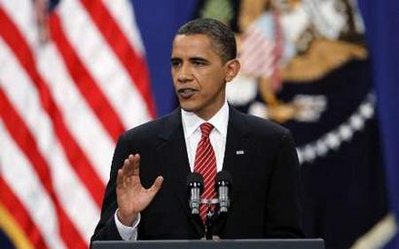
And most importantly, unlike Vietnam, the American people were viciously attacked from Afghanistan and remain a target for those same extremists who are plotting along its border. To abandon this area now — and to rely only on efforts against al-Qaeda from a distance — would significantly hamper our ability to keep the pressure on al-Qaeda and create an unacceptable risk of additional attacks on our homeland and our allies.”
This is a bit late by now, but regardless: As you all know, President Obama made the case last week for sending 30,000 more troops in Afghanistan. At this point — and like Fred Kaplan — I’m conflicted about our continued involvement there…but I’m leaning toward withdrawal. Everything I’ve heard about the war lately has had that “Vietnam in ’66” sense to it: A corrupt government as our ally; trouble winning “hearts and minds”; The US stepping half-blindly into a conflict that’s been simmering for centuries (in Southeast Asia, it was the endless Vietnamese war against interlopers; here it’s long-simmering ethnic rivalries between the Pashtuns and everyone else.) And now, our new progressive-minded president tells us: If we just commit X more troops (where, now X=30,000), we can win, close up shop, and go home. Uh, really? I think I’ve already seen this movie a few times.
Obama’s shout-out above to basically token international support doesn’t assuage my fears. And, as far as the threat posed by Vietnam: True, Tonkin never happened, but obviously policymakers of that era were less sanguine about a Communist victory in South Vietnam than we are today — The threat of the Enemy can always gets unduly amplified in the heat of the moment. (Speaking of said Reds, it should sober us to acknowledge that all we’ve done so far in Afghanistan is basically manage to re-create the Soviet experience in the region. Iirc, that didn’t end so well.)
Al Qaeda is in Afghanistan, yes, and if we could weed them out and destroy their capacity to attack again, all the better. (And always remember: If Dubya, Rummy et al had just finished the job properly in 2002 rather than salivating over Iraq, we would be in a lot better position right now.) But Al Qaeda is also in Somalia, Tajikstan, Yemen, the Philippines, Kosovo…all over the place. We don’t have the resources to play whack-a-mole in all these nations anymore, particularly when every whack usually just works to create new moles. (You’d think we learn that the Hydra sprouts two more heads every time you cut off the wrong one.)
The biggest argument in favor of increasing our military position in Afghanistan would be the continued stability of neighboring Pakistan. (There’s Vietnam again — it’s another variation of the Domino Theory.) But, there’s a good amount of evidence to suggest that more troop increases by us will only inflame the situation and further destabilize Pakistan. In which case, I’m not sure what we’re doing over there, and what we could possibly accomplish in 18 months that we haven’t gotten done the last seven years.
In short, it seems to me like we had our shot in Afghanistan, and Dubya blew it. I could be wrong, of course. But, to my mind, now feels like a good time to recognize that fact and stop chasing good money after bad.
Paranormal Activity.
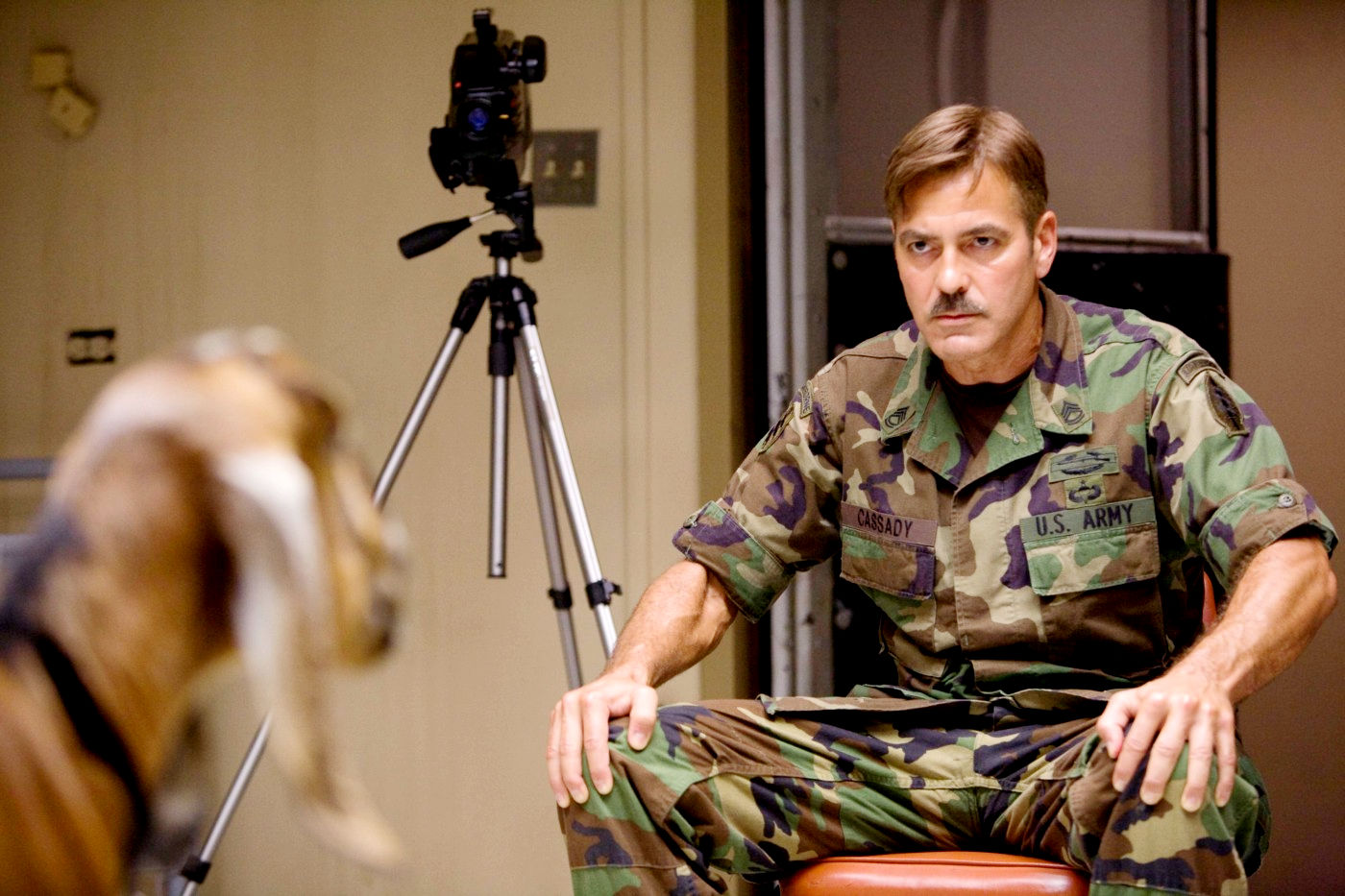
But however frothy about its subject at times, The Men Who Stare at Goats manages to sustain a low-key whimsy and amiable weirdness for most of its run. If anything it feels a bit like the much-maligned and underrated Ocean’s 12: a bunch of exceedingly likable actors — George Clooney, Ewan MacGregor, Jeff Bridges, Kevin Spacey, Stephen Root, Stephen Lang, Robert Patrick — all enjoying an extended goof. Consider it the Road to Iraq, Hope and Crosby-style. David Crosby, that is.
Loosely based on the book by British journalist Jon Ronson, The Men Who Stares at Goats begins with an ambiguous disclaimer (“More of this is true than you would believe“), a Kitty Pryde-experiment gone awry, and a voiceover by one Bob Wilton (MacGregor), a down-on-his-luck reporter for the Ann Arbor Daily-Telegram. (Wilton, unlike Ronson, is an American, although MacGregor’s scattershot accent may make you wonder. Ewan’s a fine actor, but, lordy, he can’t get the Yankee patter down to save his life — yes, it’s worse than Peter Sarsgaard’s British accent, although it’s still better than Don Cheadle’s cockney.)
Anyway, after a chance interview with a psychic hamster-killer (Root) and a falling-out with his cuckolding wife and their mutual boss, Bob alights to Iraq, where he presumes he’ll learn how to impress his now-ex with grim tales of life as a veteran war correspondent. But unfortunately, he can’t even get into the country…until he happens upon Lyn Cassady (Clooney). Disguised as your run-of-the-mill private contractor, Cassady in fact turns out to be a psychic spy, a master of the “sparkly eyes,” a, as he puts it, “Jedi warrior.” (To which MacGregor consistently responds, “Jedi?,” with an arched eyebrow. Like, who in their right mind would spend years doing that?)
Cassady, it turns out, was trained in the psychic arts by his very own Qui-Gon, Bill Django (Bridges). A Vietnam veteran who discovered his own psychic powers through a rigorous regimen of Hippie indulgence, Django managed to convince the Pentagon powers-that-be back in the day that the Age of Aquarius would soon eclipse the Atomic Age on the battlefield — we’re talking peace warriors, psychic samurai, astral projectors, the awesomely unstoppable power of good vibes, brah, you know? (Put simply: “This aggression will not stand, man.”)
Some of the brass (mainly Lang) become fervent believers in Django’s New Age warfare. Others figure, heck, if there is something to this paranormal business, we’d really hate to be on the wrong side of the ball when the psychic shooting starts — Let’s throw some money at it just in case the Russkies are reading our minds right now. And so the First Earth Battalion is born. (And, yes, it really was born — your tax dollars at work.) But, of course, problems emerge — Not all the recruits have Django and Cassady’s intrinsic shamanic gifts. And once the Jedi are founded, there is naturally a Sith waiting in the wings…and, he (Spacey) has no compunction about using the team’s psychic powers for evil. Ya fook one goat…
The rest of the story involves Wilton and Cassady having crazy misadventures in Iraq, while Lyn fills us in on the rise and fall of the First Earth order…which may or may not be gone for good. (After all, someone’s gotta put the psy- in psy-ops.) I presume much of the Iraq narrative was added by Heslov, and sometimes it’s a bit hit-or-miss, frankly. There are brief encounters with Iraqi bounty hunters, ne’er-do-well Blackwater types, and even the infamous Barney-fueled detention chambers, but the tone is too breezy to sustain any kind of edgy or cutting critique of this stuff — It’s more like Syriana on nitrous oxide. (There’s also a sequence involving a LSD-crazed soldier shooting up his army base, which feels more uncomfortable than probably intended, coming right after the tragedy at Ft. Hood.)
Still, while Syriana, or Three Kings, for that matter, — My, Clooney has done a lot of tours in the region now — offers more in the way of food for thought, The Men Who Stare at Goats has its own low-key charms. As I said, the actors are all top-notch and clearly having fun with this project. It’s always good to see the Dude again, even in passing. And the script is relentlessly witty, with wry jokes that slowly creep up on you like a psychic ninja — For example, Spacey talking about the power of subliminal messages, then being distracted by Twizzlers. Mmm, Twizzlers.
Speaking of subliminal messages, I’ve had Boston’s “More than a Feeling” stuck in my head for over a week now thanks to this movie, and I really can’t stand Boston. So, well-played, Jedi, well-played.
Hard Times in the Emerald City.
Somebody was going to get to the bottom of this whole WMD thing eventually — it might as well be Jason Bour…Oh, wait, he’s not Bourne this time? Well, close enough for government work. Matt Damon and Paul Greengrass reunite in the new trailer for Green Zone, verrrrry loosely based on Rajiv Chandasekaran’s Imperial Life in the Emerald City and co-starring Amy Ryan, Brendan Gleeson, and Greg Kinnear. Great cast, and Greengrass hasn’t missed yet — I’m in.
State of Play.
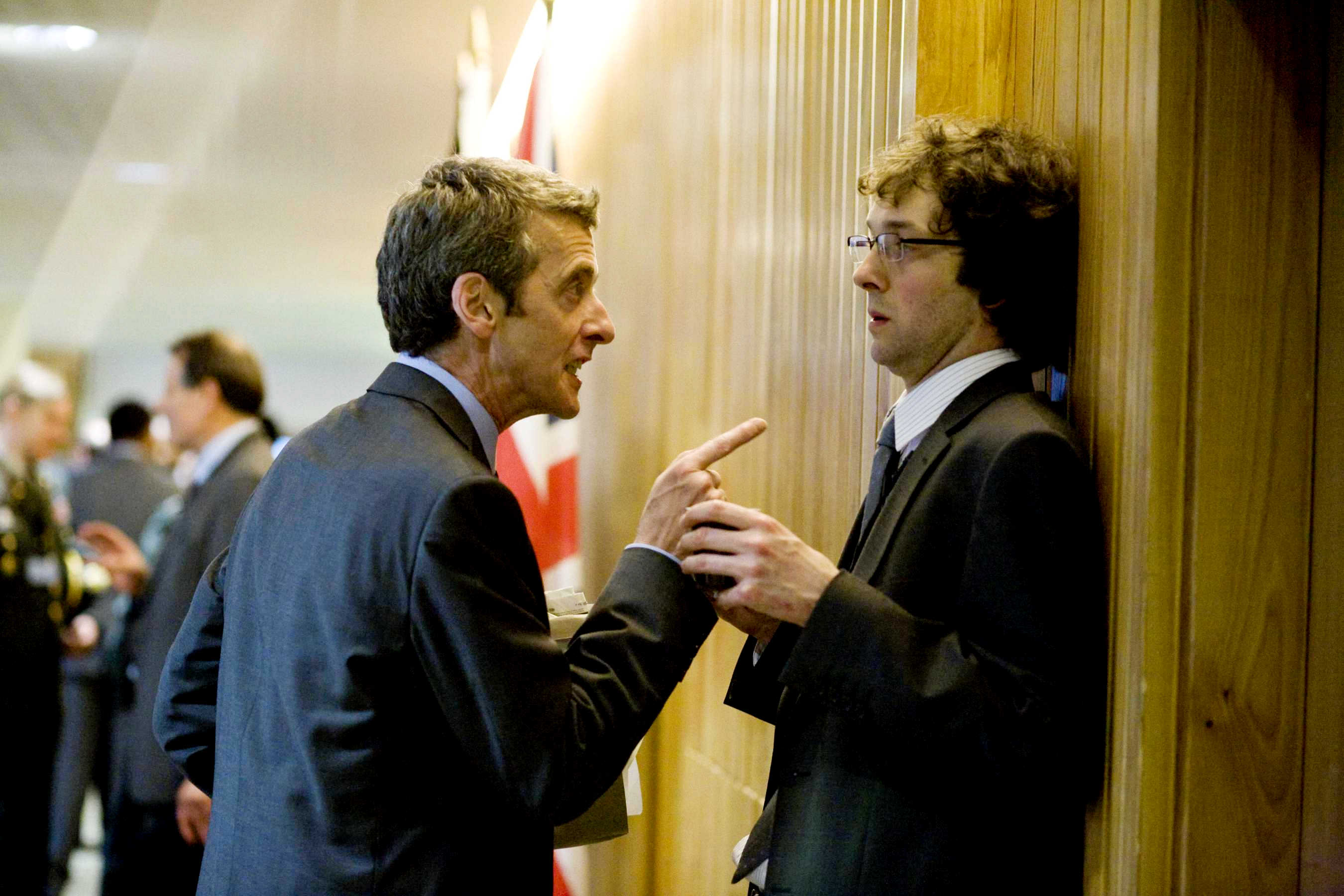
But, that one small caveat aside — and to be fair, In the Loop is apparently based on a British TV show (The Thick of It) that was more timely (and is going in the Netflix queue) — this is a gut-bustingly funny film. I honestly can’t remember the last time I laughed so hard in a theater. (Alas, it was probably 21 Grams, and that was for all the wrong reasons.) True, given that this is a sharp-edged, basically anti-Dubya political satire that goes out of its way to reward pop-culture geekery (Frodo, Ron Weasley, and the White Stripes are all used as epithets at one point or another), I’m probably as close to a target audience for this sort of movie that’s out there. Nevertheless, if your sense of humor runs anywhere from squirmathons like The Office UK or Curb Your Enthusiasm to sardonic political comedies like The Candidate or Bob Roberts to the current-events commentaries of Stewart and Colbert, this movie is a must-see. (And if you don’t find hyperarticulate Scotsman Peter Capaldi spewing forth rococo profanities funny just yet, you probably will after watching In the Loop.)
Iannucci’s film begins with another day in the life of Malcolm Tucker (Capaldi), the tough-as-nails, take-no-guff director of communications at 10 Downing St. (Think Rahm Emanuel, but funny.) This particular morning, Tucker quickly becomes enraged by the latest slip-up by the seemingly ineffectual Minister for International Development, Simon Foster (Tom Hollander, best recognized in America from the Pirates sequels.) To wit, Foster responded to a direct press question about an impending Mideast conflict by blurting out that “war is unforeseeable.” This is not “following the line,” as Tucker puts it, but after a stern rebuke, the Minister — and his communications team, new guy Toby (Chris Addison) and competent veteran Judy (Gina McKee) — only compound the error. Foster gets completely lost in the thicket at a follow-up press avail, and soon manages to mangle his way through to an even more unwieldy soundbite: “To walk the road of peace, sometimes we need to be ready to climb the mountain of conflict.” (Tucker’s livid response to this policy breach: “You sound like a f**in’ Nazi Julie Andrews.“)
Nonetheless, this sort of Zen pronunciamento is exactly the sort of thing the big boys in Washington want more of, even if no one (least of all Foster) seems to know what exactly he was driving at. Soon both the Hawks (represented by a Rumsfeldian David Rasche) and the Doves (mainly State Dept. deputy Mimi Kennedy and peacenik general James Gandolfini) think they’ve found an ace-in-the-hole in the confused minister. Meanwhile, this being Washington, a town that’s “like Bugsy Malone, but with real guns,” there’s another tier of shenanigans brewing under the principals. State Dept. aide Liza Weld (Anna Chlumsky) has penned a career-killing memorandum — soon acronymed, in DC fashion as “PWIP PIP” — that outlines the few pros and many cons of the imminent war. And Foster’s new man Toby has managed to inadvertently leak the real name of the War Committee to his friend at CNN — naturally, it was the committee with the most boring-sounding title.
Throw in a few more byzantine political subplots — more aides, committees, leaks, and whatnot — and simmer, and you have what amounts to the smartest, funniest political satire I’ve seen in a good long while. This is also clearly a movie that will reward repeat viewing, and I could see In the Loop someday being quoted as often and as lovingly in certain circles as The Big Lebowski. It may not be everyone’s cup of bile, I suppose, but if you’re generally a reader of this site, I’m guessing you’ll probably enjoy it as much as I did. So, if this movie is still playing in your area, go check it out…or brave the unholy wrath and frightening verbiage of Mr. Tucker. War may be “unforeseeable” — your enjoyment of In the Loop is not.

Dusty and the Black Sites.
“Eventually, the agency’s network would encompass at least eight detention centers, including one in the Middle East, one each in Iraq and Afghanistan and a maximum-security long-term site at Guantanamo Bay, Cuba, that was dubbed Strawberry Fields, officials said. (It was named after a Beatles song after C.I.A. officials joked that the detainees would be held there, as the lyric put it, ‘forever.’)“
Charming. The NYT gets a window into the CIA’s top-secret “black sites” program courtesy of former #3 man Dusty Foggo, who — irony alert — is currently serving a three-year term in a Kentucky jail on fraud charges associated with Duke Cunningham. (I presume Kentucky’s finest have yet to break out the “enhanced interrogation techniques” on this joker. Speaking of which, “[n]othing exotic was required for the infamous waterboards — they were built on the spot from locally available materials…The cells were constructed with special features to prevent injury to the prisoners during interrogations: nonslip floors and flexible, plywood-covered walls to soften the impact of being slammed into the wall.“)
Frere Jacques, Dormez-Vous?
z'[W]ith Reagan, the prophecy appreciation part of his brain functioned quite independently of the part that started wars (there’s nothing in the Old Testament about Nicaragua or even Grenada). Bush seems to have taken the threat of Gog and Magog to Israel quite literally, and, if this story can be believed, to have launched a war to stop them.“
One rather frightening story from a few days ago: As if the recent “Onward Christian Soldiers” war reports in GQ weren’t Crusadery enough, it appears that Dubya explictly invoked the End of Days to convince Jacques Chirac to get involved in the Iraq War, making his appeal Christian-to-Christian about the unholy dangers of Gog & Magog. Uh, really? (Apparently, Chirac has confirmed it.)
Hurts so Good.

As The Hurt Locker opens, we meet a three-man Explosive Ordnance Disposal (EOD) team out of Bravo Company doing what they do best: locating, examining, and disposing of an Improvised Explosive Device (IED) in the streets of Baghdad. Even on a run-of-the-mill call like this, and despite the jaunty banter among team members — the temperature is rising, the tension is thick, and the situation is life-or-death. For the IED in question could blow at any moment and take out everybody around…or it could be triggered by any one of the onlookers gathered, perhaps innocuously, perhaps not, to watch the soldiers work. Well, in this particular case of somebody-setting-us-up-the-bomb, things happen to go terribly awry. And, only six weeks out from the end of Bravo Company’s deployment, a crucial spot opens up on this EOD team.
Enter Staff Sgt. William James (Jeremy Renner), an amiable, reckless, possibly suicidal fellow who, not unlike Harry Tuttle, “came into this game for the action, the excitement. Go anywhere, travel light, get in, get out, wherever there’s trouble, a man alone.” (It’s this same devil-may-care attitude and notable lack of self-protective instinct, presumably, that eventually got him reassigned to zombie-stricken London.) Particularly showing up as he does so close to Bravo Company’s ship-out date, James’ cowboy moxie in the field causes huge headaches for his teammates (Anthony Mackie, Brian Geraghty), who even at one point contemplate fragging the guy. But, just as Jimmy McNulty is startlingly good po-lice despite his many disastrous personal foibles, Staff Sgt. James turns out to be surprisingly in his element whenever the situation deteriorates. And, amid the alleyways, warehouses, dust, and rubble of the Emerald City, the situation tends to deteriorate pretty much constantly.
The Hurt Locker isn’t really a commentary on our Iraq excursion like other movies in the genre we’ve seen of late. (Grace is Gone, Lions for Lambs) Like Generation Kill, it aims mainly to recreate the visceral experience of the war by getting us into the headspace of the men on the front lines. Inasmuch as there is a wider moral to this tale, it’s found in the epigram — “war is a drug” — taken from Chris Hedges’ War is a Force that Gives Us Meaning. Or, if you’d prefer, the same point is found in the first ten minutes of Apocalypse Now: “When I was home after my first tour, it was worse…I hardly said a word to my wife, until I said ‘yes’ to a divorce. When I was here, I wanted to be there; when I was there, all I could think of was getting back into the jungle.“
Scratch a little deeper, tho’, and you can find glimmers of a wider critique of the Iraq fiasco in Bigelow’s film — indeed, you could argue that these moments have more force because they’re so throwaway. After a Iraqi cabbie breaks a cordon, stares down the EOD team for unclear reasons, and is summarily carried away after finally backing down, James quips, “Well, if he wasn’t an insurgent, he sure is one now.” Later, David Morse briefly appears as some high-ranking muckety-muck akin to Godfather who has little regard for Geneva niceties, and Ralph Fiennes and Jason Flemyng also show up as British operatives looking to make some easy quid as bounty hunters on the side.
These small moments notwithstanding, The Hurt Locker is mostly apolitical, focusing mainly on the men (and it’s just men here) who find themselves deep in the midst of the suck. And, on that level, it’s a rousing success. In all honesty, the film cheats a bit by giving this EOD team a wider set of experiences than I think is probably likely — at various points they are forced into sniper and resource extraction missions by the course of events. But, that’s a quibble — for the most part Hurt Locker is as tense a thriller as I’ve seen in years.
Bigelow understands intuitively what far too many action directors these days miss: It’s not the size of the explosion or the volume of bullets fired that determine the quality of an action flick, but the slow, remorseless buildup to the potentially deadly events. In vignette after vignette, The Hurt Locker ratchets up the suspense by degrees, until you find yourself — like the EOD team we’re following — living out each moment in a heightened state of tension, endlessly waiting for the other shoe to drop. It’s an impressive moviemaking feat, and it helps to make The Hurt Locker one of the best films of the year.
